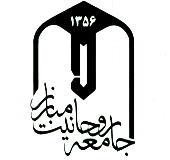
The Islamic Consultative Assembly, also called the Iranian Parliament, the Iranian Majles, is the national legislative body of Iran. The Parliament currently has 290 representatives, changed from the previous 272 seats since the 18 February 2000 election. The most recent election took place on 26 February 2016 and the new parliament was opened on 28 May 2016.

The Iranian parliamentary elections of February 20 and May 7, 2004 were a victory for Islamic conservatives over the reformist parties. Assisting the conservative victory was the disqualification of about 2500 reformist candidates earlier in January.

Abdollah Noori is an Iranian cleric and reformist politician. Despite his "long history of service to the Islamic Republic," he became the most senior Islamic politician to be sentenced to prison since the Iranian Revolution when he was sentenced to five years in prison for political and religious dissent in 1999. He has been called the "bête noire" of Islamic conservatives in Iran.

Iran elects on national level a head of state and head of government, a legislature, and an "Assembly of Experts". Also City and Village Council elections are held every four years throughout the country. The president is elected for a four-year term by the people. The Parliament or Islamic Consultative Assembly has 290 members, elected for a four-year term in multi- and single-seat constituencies. Elections for the Assembly of Experts are held every eight years. All candidates have to be approved by the Guardian Council. See Politics of Iran for more details.

The Iranian presidential election of 1993 took place on June 11, 1993 which resulted in the re-election of the incumbent president, Akbar Hashemi Rafsanjani.

Hojatoleslam Hadi Khamenei is an Iranian reformist politician, mojtahed and linguist. He is a key member of the reformist Association of Combatant Clerics, and a former deputy of the Majlis of Iran representing a district in Tehran.
Parliamentary elections were held in Iran on 18 February 2000, with a second round on 5 May. The result was a solid victory for 2nd of Khordad Front and its allies, the reformist supporters of President Mohammad Khatami.

Legislative elections for Majlis of Iran were held on 14 March 2008, with a second round held on 25 April 2008. Conservatives loyal to President Mahmoud Ahmadinejad were considered the victors of the election, at least in part because "all the most prominent" reformist candidates were disqualified from running.

Parliamentary elections were held in Iran on 8 March 1996, with a second round on 19 April. The Combatant Clergy Association and its allies emerged as the largest bloc in the Majlis, winning 110 of the 270 seats.

Parliamentary elections were held in Iran on 13 March 1980, with a second round on 9 May. They were the first elections to the Majlis since the overthrow of the Shah, and were contested to a considerable degree on a party basis.

Parliamentary elections were held in Iran on 8 April 1988, with a second round on 13 May. The result was a victory for leftist politicians who later emerged as reformists. The number of clerics elected to the Majlis was reduced by over a third.

The parliamentary election for the 9th Islamic Consultative Assembly, or Majlis, were held in Iran on Friday, 2 March 2012 with a second round on 4 May 2012 in those 65 districts where no candidate received 25% or more of the votes cast. More than 5,000 candidates registered but more than a third were disqualified by the Guardian Council leaving about 3,400 candidates to run for the 290 seat representing the 31 provinces.

Constitutional Convention elections were held in Iran on 3 and 4 August 1979. The result was a victory for the Islamic Republican Party. 10,784,932 voted in the elections, marking 51.71% turnout. Of all members elected, 68% were clerics.

Parliamentary elections were held in Turkmenistan on 11 December 1994. All 50 seats were won by the Democratic Party of Turkmenistan, the only party registered prior to the elections, with only one of the 50 constituencies being contested. Voter turnout was 99.8%.

The Supreme Leader of Iran, also referred to as Supreme Leader of the Islamic Revolution, but officially called the Supreme Leadership Authority, is the head of state as well as the ultimate political and religious authority of the Islamic Republic of Iran. The armed forces, judiciary, state television, and other key government organizations are subject to the Supreme Leader. The current longtime officeholder, Ali Khamenei, has been issuing decrees and making the final decisions on economy, environment, foreign policy, education, national planning, and everything else in Iran. Khamenei also makes the final decisions on the amount of transparency in elections, and has dismissed and reinstated presidential cabinet appointees. The Supreme Leader directly chooses the ministers of Defense, Intelligence and Foreign Affairs, as well as certain other ministers, such as the Science Minister. Iran's regional policy is directly controlled by the office of the Supreme Leader with the Ministry of Foreign Affairs' task limited to protocol and ceremonial occasions. All of Iran's ambassadors to Arab countries, for example, are chosen by the Quds Corps, which directly report to the Supreme Leader.
Assembly of Experts election were held in Iran on 26 February 2016 to elect Assembly of Experts members. The 88 members of the Assembly of Experts, known as mujtahids, are directly elected. The elections had been planned for 2014, but were delayed by a year in order to hold them alongside the Islamic Consultative Assembly elections.
The "Deviant current" or "Current of deviation" is a term used by Iranian officials and conservative rivals of Mahmoud Ahmadinejad to describe Ahmadinejad's entourage which functions like a faction or party.























